
In an early moment in Siddharth Anand's Pathaan, two scientists talk about love. One of them asks the other why he still wants to impress his wife even after being married for thirty years. The other replies, "Science is easy, Farooqui; love is hard." Moments later, a masked man with a voice similar to that of Bane from The Dark Knight Rises kidnaps these scientists. The man is Jim (John Abraham), a former intelligence agent of India who now offers terrorism as a service (TAAS?) to organizations worldwide. He then enters into a car chase with the eponymous Pathaan (Shah Rukh Khan), also a former intelligence agent who now works as a counterterrorism specialist. These two men again talk about love. Jim calls himself an aashiq of India. However, the Indian government refused to negotiate with terrorists when he and his wife were kidnapped. Due to this reason, his relationship with India turned sour. He is heartbroken. Like a jilted lover, the Patriot tattoo on his arm is a remnant of the time he was in love. He sings and whistles Ae Mere Watan Ke Logon sarcastically. On the other hand, there is Pathaan. His love for India is like that between a mother and a son. Like the way, his boss Nandini (Dimple Kapadia) says, "Mere bete jaisa hai." Pathaan's love for his mother is not transactional like Jim's. "Ek soldier yeh nahi puchhta desh ne uske liye kya kiya, puchta hai woh desh ke liye kya kar sakta hai." Pathaan tells the story of these two men—the protagonist and the antagonist—who represent these two forms of love.
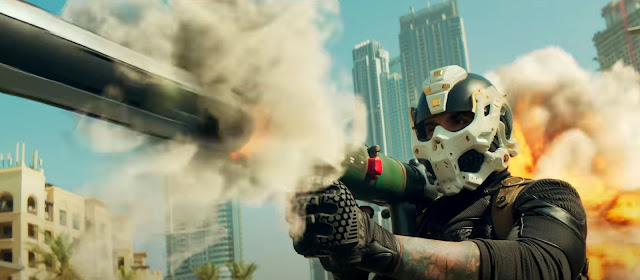
If Jim was heartbroken, Pathaan's body was broken. His body contains metal parts, titanium discs, and biodegradable screws. Pathaan uses the Japanese art of kintsugi to appreciate this brokenness. Kintsugi is the art of putting broken pottery pieces back together with gold, based on the idea that embracing flaws and imperfections can create a more beautiful piece of art. The process of repairing things creates something more unique and resilient. Pathaan uses kintsugi to build a force of similar people whose bodies and souls are broken—kuch ke shareer zakhmi hain, kuch ki rooh ghayal hai—to become more broken in the service of their country.

After the repeal of Article 370 by the Indian government, a rogue general from the Pakistani Army hires Jim to carry out a massive biological attack on Indian cities. Pathaan's mission is to stop this attack. He runs into Rubina (Deepika Padukone), a former intelligence agent of Pakistan, who, after some usual games of double-crossing, becomes his partner in the mission to stop the attack.

All the principal characters in Pathaan have been given a backstory. Jim was an intelligence officer earlier who worked with Kabir (Hrithik Roshan from War). He has no last name. Jim and his wife were kidnapped by Somali pirates. The Indian government refused to negotiate for their release. Therefore, the pirates shoot Jim's pregnant wife before his eyes. Rubina was a doctor before joining the intelligence agency of Pakistan. When she was young, she lived with her journalist father in the Middle East, who was arrested for speaking the truth against power. She saw her father being tortured before her eyes, which gives her nightmares even today. This moment of people in pain before someone's eyes is recreated when Pathaan sees one of his officers and then his Ma'am die in front of him. "It's been an honor," they both said to him.
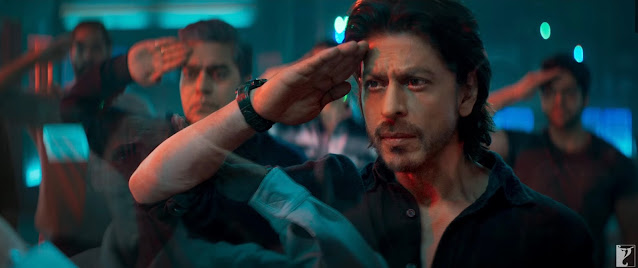
It is Pathaan's background story, however, that is far more intriguing, even if it has scant details. Like Jim, Pathaan has no last name. Not much is known about his parentage except that he was found in a cinema hall where his parents left him. The image of Anthony (Amitabh Bachchan) being found on the doorsteps of a church in Amar Akbar Anthony conjures up my mind. The cinema hall is a religion of its own in India. Pathaan then grew up in the care of his mother India. He performs his duty to become a good son and a soldier of the Indian Army. His journey from Laawaris to Khuda Gawah (both Amitabh Bachchan's films) is revealed when he saved a village in Afghanistan from a missile attack while being posted on a mission. An Afghani lady christens him Pathaan, which is interesting as Shah Rukh Khan has claimed to be a Pathaan in real life. More on the film's many other meta-moments shortly.
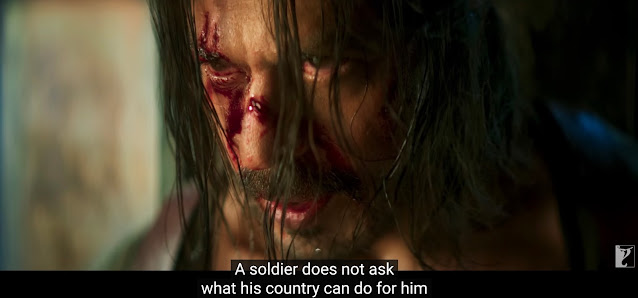

Jim plans to launch the biological attack of a mutated smallpox virus using missiles (like the missiles from Mr. India, which also had a kind-hearted orphan as the protagonist). The mutated virus is named Raktabij, after the asura who had acquired a boon from Lord Shiva that whenever a drop of his blood fell on the ground, various Raktabij would emerge from the spot, equivalent to his strength, form, and weapons. Even though Jim steals the mutated virus Raktabij, at one point, he calls himself a Raktabij. He is also called a Shaitan by General Qadir (Manish Wadhwa). In another mythological reference, Ma'am refers to Pathaan's time away as his vanvaas.

The discernible thing about Pathaan was that he was not someone who comes out with a win every time. Throughout the film, he gets beaten up by other villains. He has to be rescued by others. He also takes painkillers as he is aging. And, he also was comfortable with this vulnerability. (This thing was also seen in Anand's earlier film War, where Kabir sported grey hair.) The performances by all actors in Pathaan are in line with the mood and the tone of the film. Shah Rukh Khan is fantastic in an action role. The long hair suits him, but the ponytail does not. He also has done this voice modulation where he speaks more calmly in some scenes. Deepika Padukone kicks ass, literally and metaphorically. Besharam Rang is gorgeous. John Abraham is cool as a sophisticated villain (his background music was irritating, though). Dimple Kapadia is absolutely wonderful.
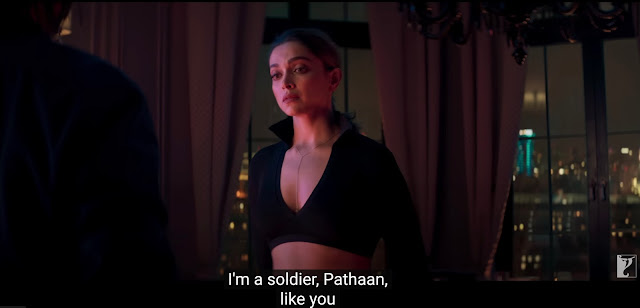
The action genre is not my favorite, but I enjoyed the film. I do not know if I will remember its action scenes a few months later. The ice skating was a good one, but the whole sequence in Russia was a bit silly. The other thing was the film did not complete some moments. For instance, how was Dr. Farooqui saved? Then, we see that Pathaan and Rubina escape by jumping into the water; so how did they reach the hotel. After they landed on the Russian building, how did they gain entry into the building? How was Pathaan captured there? It is not about logic, but there is this concept in dance to finish a moment; Pathaan did not complete these moments. This may be why War was a better film for me. It had a lot more interesting things going on. I still remember the scene where Naina (Vaani Kapoor) tells Kabir Not everyone has vowed to save India by being a soldier. For ordinary people, trying to live a decent life is a battle in itself.
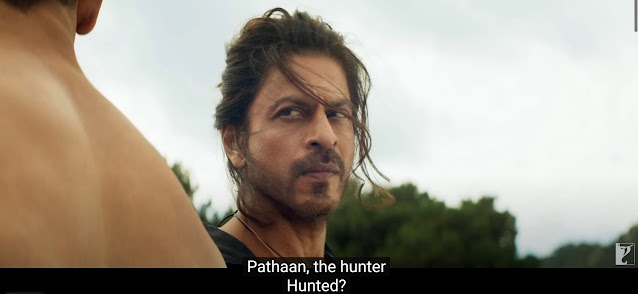

The dialogue of Pathaan was one of its best things. In an early moment, General Qadir, being asked how he is doing, replies, "Khair nahi, qahar chahiye." Jim calls India, "Kafan ka never-ending supply, bas laashon ke naam badalte rehte hain." Rubina asks Pathaan to trust him again, and she says, "Jitne galat kadam lene the, le liye, ab kadmon ke nishaan mitaane hai." At another point, Raafe (Rajat Kaul) says, "Ishq aur mushq chhupaaye nahi chupte." Pathaan also says, "Khaunf logon ko andha kar deta hai." At another point, Rubina remarks, "Kisne kaha ishq sirf pehli nazar me hi hota hai."
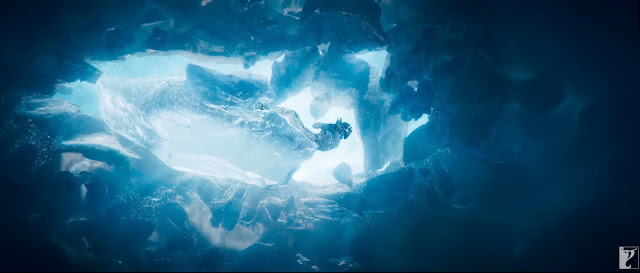
Pathaan has been written by the trio of Abbas Tyrewala, Siddharth Anand, and Shridhar Raghavan. Tyrewala had also written Farah Khan's Main Hoon Na. Jim in Pathaan reminded me of Raghavan (Suniel Shetty) in Main Hoon Na, where he, too, as an ex-Army man, becomes a terrorist after he is court marshaled for his extra-judicial encounter-killings of Pakistani people. Pathaan also believes in the idea that it is the non-state actors, such as Jim, who are responsible for terrorism, and they have a connection with any country. "Desh sarhad vagareh sab kamzor logon ko apni hadd yaad dilane ke kiye bane hain. Jahan main khada hun who mera desh," says Jim.

More than the story of Pathaan, it is the meta-commentary in the film was far more interesting. There are different levels of meta-commentary in it. The first level includes meta moments from Siddharth Anand's earlier film War. Early in the film, Pathaan fends off a villain character by mentioning Ghungroo Toot Gaye, which was also the title of a gorgeously choreographed song from War. Then, there are mentions of Kabir from War. And there is Ashutosh Rana playing Colonel Luthra, the same part he did in War. The second level of meta-commentary is the meta-universe promoted as YRF Spy Universe, where the characters from some of the earlier films of Yashraj Films find a mention and even play a small part. Tiger (Salman Khan) from Ek Tha Tiger rescues Pathaan at one stage. Jim also mentions the love story of Tiger and Zoya from the film.

The third level of meta-commentary is about Shah Rukh Khan, which includes a mélange of references and snippets from his reel and real life. Some of these are explicitly mentioned, some are implied, and the rest make one wonder if it was intentional. In the beginning moments of the film, Pathaan is walking on a treadmill, and there is a taveez that can be seen tied to his arm. It was a gift to Pathaan from a lady in Afghanistan after he saved their village. It took me to a similar moment in Veer Zaara, where Zaara's mother, Mariyam Hayaat Khan (Kirron Kher), gives a taveez to Veer (Shah Rukh Khan) after he lets go of Zaara (Preity Zinta) and travels back to India. Then, Pathaan talks about being broken and having multiple metal parts inserted inside him. This is also well documented as Shah Rukh has undergone multiple surgeries on his knee and spinal cord. He has also tweeted about feeling pain all the time.
i do have pains all the time. learning to live with them. knee surgery twice, ankle, toe, spine,shoulder & stomach. but no pain..no gain.
— Shah Rukh Khan (@iamsrk) February 19, 2010
Later, Colonel Luthra sarcastically remarks that Pathaan listens to his heart first. "Pehle hamesha apne dil ki sunte hai," he says. In Kabhi Khushi Kabhie Gham, Shah Rukh, as Rahul, spoke about listening to his heart. "Zindagi mein agar kuch banna ho, kuch haasil karna ho, kuch jeetna ho, toh hamesha dil ki suno."
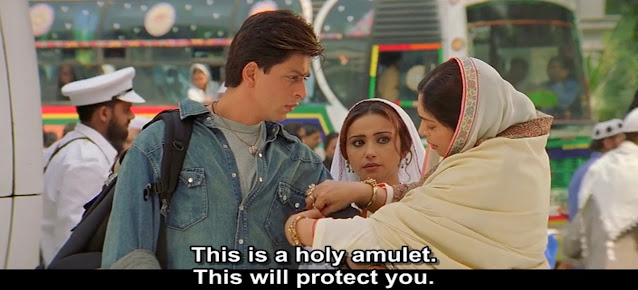
In Russia, Pathaan and Rubina plan to steal the Raktabij from the Russians, like the diamonds from the safe in Happy New Year. The lock to the vault lies with a woman who is intentionally named Karen. Her name allows Pathaan to call her K-K-K-Kiran, like Shah Rukh's character Rahul did in Darr. There is a moment when Pathaan rescues Rubai after a malfunction during the heist in Russia. They jump onto a high-rise building and slide down. The moment reminded me of the one in Main Hoon Na where Major Ram (Shah Rukh Khan) saves Lucky (Zayed Khan) from falling. Then, Pathaan is double-crossed by Rubina when she steals the orbs from him. He then falls back inside the vault, recreating the moment of the fall of Gaurav (Shah Rukh Khan) from Fan. Main Hoon Na is explicitly referenced when Pathaan is rescued by Tiger in the train sequence. Pathaan comments that he has taken the pin out of the bomb; to this, Tiger comments, "Tere pin maarne ki aadat kab jaayegi," where he was talking about the last scene from Main Hoon Na when Ram kills Raghavan by the same method. In another moment, Tiger and Pathaan then run to save their life after the train falls into a gorge, and the bridge collapses. Tiger screams, "Bhaag Pathaan Bhaag." In Karan Arjun, Karan (Salman Khan) mentioned the same dialogue to Arjun (Shah Rukh Khan)—"Bhaag Arjun Bhaag"—when they were beaten by Thakur's acolytes. And, then, in a post-credits scene (like it happens in Marvel Cinematic Universe), the two men talk about their old age and wonder if they should give it all up to the next generation (of actors). They feel none of the actors are ready to take up their mantel. They don't take any names (I wish they did), like they never revealed the film playing in the cinema where Pathaan was found (I wish they did). It is again a meta-moment where two aging superstars think about their work and are still not ready to give up.

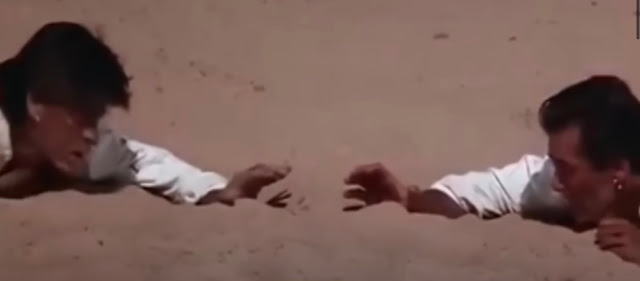

This sort of meta-commentary is not new to Shah Rukh Khan's career. His films, especially in the past decade or so, have formed what can be called the SRK Cinematic Metaverse. An entire thesis can be written on the same. This started primarily with Om Shanti Om (2007), where Shah Rukh spoofed his Rahul lover boy roles. In Rab Ne Bana Di Jodi (2008), he played Raj trying to parody his own lover-boy persona to win the love of his wife. In Luck By Chance (2009), his meta-ness became one of the most compelling things about the film. At one stage in the film, Karan Johar discusses his theory of how a new hero is born in the industry. He quotes how Shah Rukh Khan got a break in the industry when all actors refused to make a film. Shah Rukh also appears with his entourage towards the end, giving us a terrific scene. He advises a new superstar to never forget the people there with him when he was a nobody. "Unhe mat bhoolo, jo tumhe jab jaante the, jab tum kuch nahi the. Kyunki bas yahi hai jo hamesha tumhe sach bolenge." This is the same adage that Shah Rukh has followed in his life. In Billu (2009), he again played a version of his superstar actor persona where he maintained a friendship with an old friend.
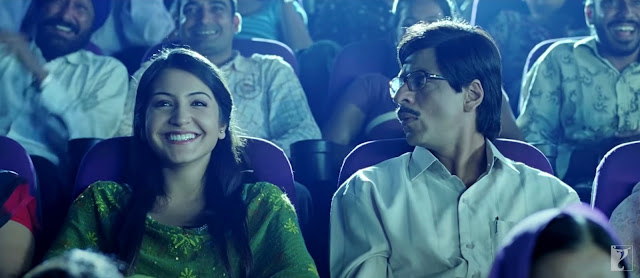

In My Name Is Khan (2010), he played a Muslim who traveled across the US to meet its president to tell him he was not a terrorist. It almost mirrored the underlying distrust in his Muslim identity when he was detained at a US airport during immigration, where he was questioned for hours, possibly due to his last name. And, like in the case of Pathaan, he faced boycott calls over the film's release. The Shiv Sena threatened to disrupt the screenings of his film if he did not apologize for backing the participation of Pakistani cricketers in the Indian Premier League. In Ra.One (2010), Shah Rukh added elements of his relationship with his son in the film. In an interview, he said, "The film talks about a father and son’s relationship. It has a bit of my relationship with my son, who thinks I’m not cool. I believe it will teach sons to love their fathers. They are as good as mothers." His next few films—Chennai Express (2013), Happy New Year (2014), and Dilwale (2015)—again contained ample references to all his earlier films. At one point in Happy New Year, he parodies his iconic sattar minute speech from Chak De! India.


In Fan (2016), Shah Rukh gave one of the most fascinating meta-films ever made in Hindi cinema. He played the role of an aging superstar troubled by a young fan who looked exactly like him. The film included elements from Shah Rukh's career. In Jab Harry Met Sejal (2017), there is again a bit of Dilwale Dulhania Le Jayenge. A man and a woman meet in Europe, fall in love, and the man travels to India to stop the woman's wedding. At some other stage, Harry (Shah Rukh Khan) tells Sejal (Anushka Sharma) that she will have to go away when the time comes. Mudkar nahi dekhna hai peeche, like in the palat scene from Dilwale Dulhania Le Jayenge. The promotional credit song Phurrr is also reminiscent of the Phurr scene from Dilwale Dulhania Le Jayenge. In Zero (2018), a scene at the party again provides a meta-commentary on the career of Shah Rukh Khan. Bauua Singh (Shah Rukh Khan) tries to show the magic of making the stars move with his hands. Many actresses who have worked with him in his films appear with him in this scene. There is Karisma Kapoor, Juhi Chawla, Kajol, Rani Mukerji, Sridevi, Alia Bhatt, and Deepika Padukone. He talks about shooting stars and showing his magic to the 'ladies.' Pathaan (2023) again adds meta-commentary from his life, but this time, it comes together more coherently, unlike in some of the films mentioned above.

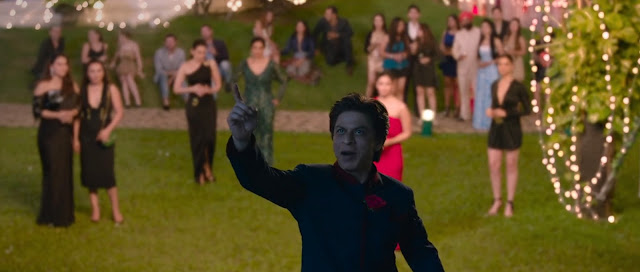
Shah Rukh Khan's return to films after four years has spurred a return to cinema for scores of his fans. They are experiencing joy by dancing to the beats of the Jhoome Jo Pathaan. They are reading different subtextual elements in the film. Love means different things to different people, and all these are ways of showering love on a man who has entertained them for thirty years. Like the scientist, who still tries to impress his wife even after getting married for thirty years, also said, "Science is easy; love is hard."
Trivia:
1. A few days ago, I wrote a post on the relationship between the characters of Ranbir Kapoor and their fathers. A longtime reader and friend, Mandar replied that he sees a similar relationship between the characters of Shah Rukh Khan and their mothers in films. It can be seen here again in Pathaan. The relationship between Pathaan and Ma'am is like that of a mother and son.


Other Reading:
1. On Fan—Link
2. On Jab Harry Met Sejal—Link
3. On Dear Zindagi—Link
4. On Raees—Link
5. On Shah Rukh Khan and the world of stars and the moon—Link
6. On Swades—Link
7. On Satrangi Re—Link
8. On Kabhi Alvida Naa Kehna—Link
Dialogue of the Day:
"Khaunf logon ko andha kar deta hai."
—Pathaan, Pathaan
—Pathaan, Pathaan

Brilliantly written, Sir. Another meta-reference was the Dubai scene where SRK's car has had an accident and John walks in, whistling the Ae Mere Watan Ke Logon tune. SRK is hanging in the car upside down, just like he did in Dilwale (2015), in the scene where he finds out the truth about Kajol's character.
ReplyDeleteTotally agree!!
Delete